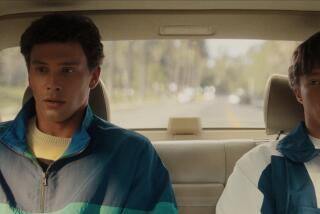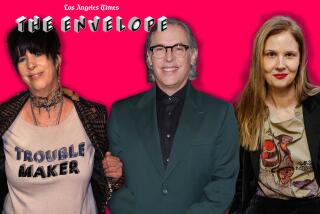MOVIE REVIEW : SOHO COMES ALIVE IN ‘AFTER HOURS’
In his sweetly ominous “After Hours” (selected theaters), director Martin Scorsese catalogues our fears. Social fears of seeming wimpy and being dateless and alone for ever . Nice sensible urban fears of dark lonely city streets, of muggers, predators and the New York subway system at a late hour. Then he shuffles them and deals a personal-size comedy, so relentlessly exact that it’s hilarious.
“After Hours” takes place during one long night as an amiably dorky computer operator, Paul Hackett (Griffin Dunne), ventures from his predictable turf on the Upper East Side into SoHo. The lure is Marcy (Rosanna Arquette), who makes any impulsive behavior completely understandable. She picks him up (over his copy of “Tropic of Cancer,” a quaintly old-fashioned touch); he returns the overture with a phone call and the night’s catastrophes begin.
Within a few hours he’s lost the $20 he began with, he has been treated to a kamikazi taxi ride (like a good New Yorker, Paul can’t admit his terror; his only reaction is a pleasant, “No hurry”), he’s been given a primer of SoHo sadomasochism and the tightening feeling that if there is a target for tonight, he may be it.
“After Hours” is dazzling movie making; you could get a giddy kick just from cinematographer Michael Ballhaus’ shot as a set of house keys floats down toward the camera, tossed from a top-floor apartment. (Ballhaus’ glittering authority with color was honed during his many films for R. W. Fassbinder; more recently he shot “Baby, It’s You” and “Heartbreakers.”) But the film’s bedrock is its pungently well-observed screenplay by 26-year-old Joseph Minion, whose debut this is.
You realize how good Minion is early on, during the carefully nuanced pauses and spurts of Paul’s call to Marcy. As Paul tries to be casual, roguish, man-of-the-world and off-handed, all at once, Minion characterizes with deadly affection. Listen a few scenes later, as Marcy tosses out a few dozen details of her personal life that might electrify Krafft-Ebing. This is a writer deliciously attuned to big-city instant intimacy.
Scorsese revels in all this. “After Hours” is less dark psychologically than most of his other New York-based films, and he whips it into a fast-moving froth with editing (Thelma Schoonmaker) and production design (Jeffrey Townsend) as elegant as the Bach-and-Mozart sound track.
The film is beautifully cast, beginning with Dunne, whose small, pointy features and round dark eyes suggest Stuart Little as a neurotic New Yorker. Arquette has just the right edge as Marcy who, in the space of five minutes, can be open, seductive, hysterical, vague, trusting and dangerous. Linda Fiorentino is splendid as the massively arrogant Kiki, Marcy’s sculptress roommate, the twisted sister of the piece. You can spot Cheech and Chong, rumbling their almost-private running commentary as they systematically rip off most of SoHo. Teri Garr, who seems mired in 1965, has the film’s most touchingly bizarre role as a despondent waitress working in John Heard’s bar.
There is one bit of relief in Paul’s pell-mell flight, as he is taken in by a shy young man (novelist Robert Plunket in a nice acting turn) intent on his first homosexual encounter. It’s only a momentary respite. As the film escalates, so do its surreal qualities. We begin to see SoHo not as a colony of flaky “artists,” virtually unapproachable by the non-artist (clowns like Paul--or us), but as a pack of sharks, both male and female. (That much is even hinted at in a bit of bathroom graffiti.)
The natives begin to roam in hunting packs. Instead of the civilized Mozart Symphony in D Major, which accompanies the opening scenes, you half expect the frenzy of “A Night on Bald Mountain” and its final, exhausted calm at the approach of dawn and the retreat of the demons. Then, suddenly it’s over. Not as scary as we thought it would be--really quite funny. Until you think it over afterward.
More to Read
Only good movies
Get the Indie Focus newsletter, Mark Olsen's weekly guide to the world of cinema.
You may occasionally receive promotional content from the Los Angeles Times.










